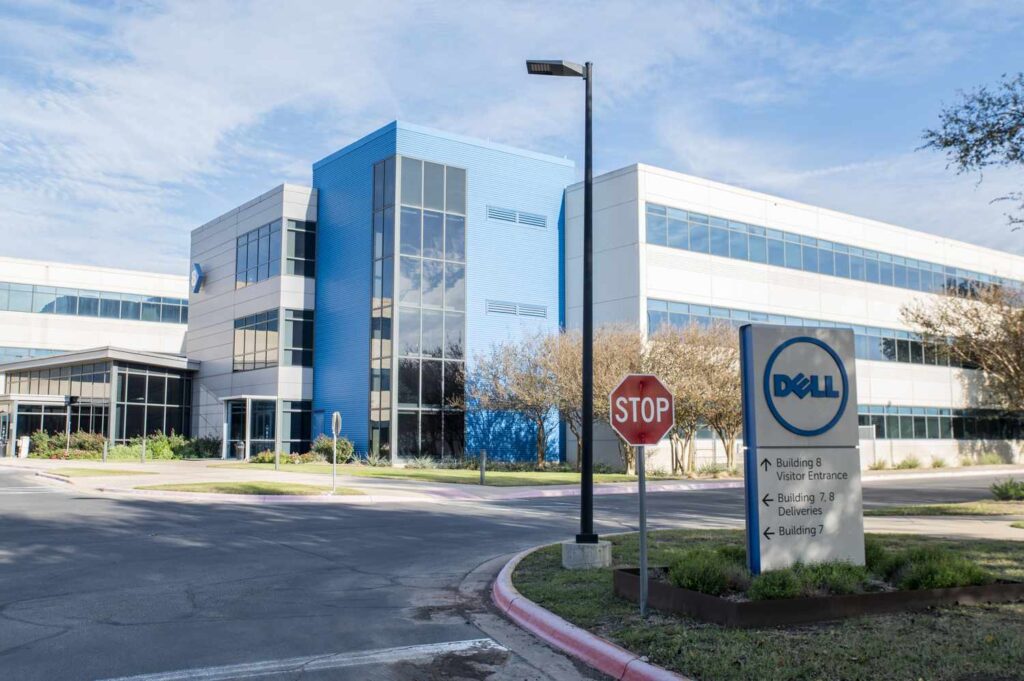Dell’s latest financial forecast fell short of market expectations, with the company projecting lower-than-expected profits for the current quarter. This news, coupled with indications of margin pressure due to increased costs associated with building servers optimized for heavy AI workloads, led to a significant drop in Dell’s shares, plunging over 17% in after-hours trading.
The Round Rock, Texas-based tech giant anticipates a decline of approximately 150 basis points in its adjusted gross margin rate for fiscal 2025. For the ongoing quarter, Dell forecasts adjusted profit per share of $1.65, with a range of plus or minus 10 cents. This projection contrasts with analysts’ average estimate of $1.84, as per data from LSEG.
During a post-earnings call, Chief Financial Officer Yvonne McGill attributed the anticipated gross margin rate decline to several factors, including inflationary input costs, competitive market conditions, and an increased proportion of AI-optimized servers within Dell’s product mix.
The growing demand for high-performance computing and large-scale data centers, driven by the rising adoption of generative AI, has spurred investments in AI-capable products. Dell, among other companies, has witnessed heightened demand for servers designed to handle AI workloads.
According to Chief Operating Officer Jeff Clarke, Dell experienced a significant uptick in shipments of its AI-optimized servers, surpassing $1.7 billion, while the backlog surged by over 30% to reach $3.8 billion.
Dell recently introduced a lineup of AI-enabled PCs featuring Qualcomm processors and announced plans to launch a new server supporting Nvidia’s latest chips in the latter half of 2024.
Despite the disappointing forecast, Dell’s stock has performed remarkably well this year, more than doubling in value and reaching record highs earlier in the week. For the second quarter, Dell anticipates revenue in the range of $23.5 billion to $24.5 billion, surpassing analysts’ average estimate of $23.21 billion.
Additionally, Dell raised its revenue forecast for fiscal 2025 to a range of $93.5 billion to $97.5 billion, up from the previous projection of $91 billion to $95 billion.
In the first quarter ended May 3, Dell reported a 6% increase in revenue to $22.24 billion, marking a positive turnaround after six consecutive quarters of decline. Adjusted profit aligned closely with analysts’ expectations. Notably, revenue for Dell’s infrastructure solutions group, encompassing storage, software, and server offerings, surged by 22% to $9.23 billion, while the client solutions group, comprising PCs, reported flat revenue.
ell’s latest financial forecast has raised concerns among investors as it fell short of market expectations. The company’s projection of lower-than-expected profits for the current quarter has sent shockwaves through the market, resulting in a significant drop of over 17% in Dell’s shares during after-hours trading. This unexpected development has prompted a closer examination of Dell’s financial health and its ability to navigate the challenges ahead.
Based in Round Rock, Texas, Dell has long been a major player in the technology industry, known for its innovative products and solutions. However, the company’s recent forecast suggests that it may be facing headwinds in the form of margin pressure. According to Dell’s projections, its adjusted gross margin rate is expected to decline by approximately 150 basis points in fiscal 2025. This decline is attributed to various factors, including inflationary input costs, competitive market dynamics, and a higher proportion of AI-optimized servers within Dell’s product portfolio.
The rise in demand for high-performance computing and large-scale data centers, driven by the increasing adoption of generative AI, has been a significant driver of growth in the tech industry. Dell, like many of its competitors, has witnessed a surge in demand for servers designed to handle AI workloads. This increased demand has led to higher investments in AI-capable products, reflecting a broader trend in the industry.
Chief Operating Officer Jeff Clarke highlighted Dell’s strong performance in the AI server market, noting that shipments of the company’s AI-optimized servers more than doubled to surpass $1.7 billion. Additionally, Dell reported a significant increase in backlog, which grew by over 30% to reach $3.8 billion. These figures underscore Dell’s growing presence in the AI space and its ability to capitalize on the growing demand for AI-related technologies.
If you like the article please follow on THE UBJ.
